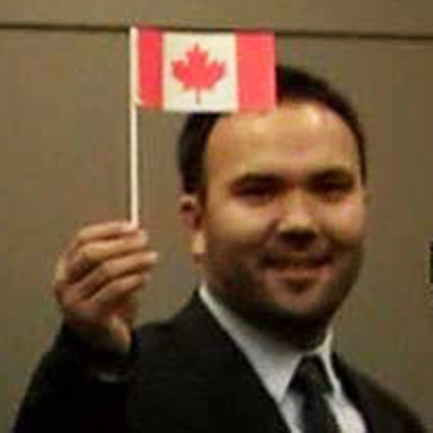Canadian diplomats failed to contact the Chinese family of Huseyin Celil for more than 10 months after the Canadian citizen was arrested, family members say.
The family members — including Mr. Celil’s mother, brother and sisters — say they did not hear from the Canadian embassy until Wednesday of this week. That was five days after the first court hearing for Mr. Celil, the religious leader and refugee who was arrested in Uzbekistan last year and extradited to China. Canada’s diplomats did not attend that hearing.
Canada’s Department of Foreign Affairs says it has been trying to get consular access to the Canadian imam since his arrest in March of 2006. Yet his family members in China revealed yesterday that nobody from the Canadian government got in touch with them until a political uproar in Ottawa in which Prime Minister Stephen Harper upbraided his diplomats for failing to attend the court hearing.
In Halifax yesterday, Foreign Affairs Minister Peter MacKay said he didn’t know why consular officials in China had not established contact with Mr. Celil’s case earlier. But it’s something he wants to know. “We’re going to get to the bottom of this and see that there is a greater degree of contact.”
Mr. Celil’s family members, who are cotton farmers in one of China’s poorest and most remote regions, had no inkling that he was legally entitled to help from the Canadian government. They said they are happy that Canada is finally helping, but disappointed that it took so long.
“We are just farmers, and we didn’t know anything about this law,” said Mr. Celil’s brother, Sarmeti Celil, in Urumqi, capital of the largely Islamic region of Xinjiang in the far west of China.
“Now that I know about this law, I find it strange and surprising that they didn’t contact us until now. If the diplomats had been at the court hearing, we would have felt more protected and less alone.”
The family members, who earn only a few hundred dollars a year from their small plots of cotton and wheat, say they have been persecuted by Chinese authorities for the past decade. Their home has been raided and searched by Chinese police almost every month since Mr. Celil left China in 1996.
They were denied permission to have a Chinese passport, and Mr. Celil’s three children from his first marriage were prohibited from joining him in Canada.
Mr. Celil’s 75-year-old mother, Shalehan Spander, said she still prays that his three children will some day be allowed to leave China and go to their father’s home in Canada. “I hope, when I die, my three grandchildren will be allowed to go to Canada,” she said tearfully.
Critics say Canada should have done everything possible to fight for Mr. Celil’s release from prison, even if it meant travelling to Xinjiang for the trial. Nineteen of his relatives, including his brother and mother, attended the court hearing, so they were a natural link to the imprisoned Canadian.
Instead, it appears that the Canadian embassy in Beijing was preoccupied with formal requests for permission to meet Mr. Celil. Those requests have been flatly refused by Chinese authorities since the beginning of the affair.
China has refused to recognize Mr. Celil’s Canadian citizenship and has kept him in an undisclosed location, possibly a prison in Urumqi, although that is not clear.
After the court hearing last week, 15 of Mr. Celil’s relatives went to a police station in Urumqi to ask permission to meet him.
The police rejected the request, saying “the social influence would not be good,” according to the relatives.
The relatives are uncertain whether they are being kept under police surveillance, and they were nervous about meeting The Globe and Mail and asked to meet at a local hotel where they felt safer.
Mr. Celil is a member of the Uyghur minority, an Islamic people whose rights have been harshly restricted by the Chinese government. China has alleged that Mr. Celil had links to violent separatist groups in Xinjiang, although it has not presented any evidence so far.
In Ottawa this week, a senior Chinese official promised that Mr. Celil will not be executed. Many other Uyghurs, however, have been executed for their activities. Yesterday, it was revealed that another Uyghur prisoner, Ismail Semed, was executed on Thursday in Urumqi for separatist activities.
Written by: Geoffrey York
Original Link: theglobeandmail.com/news/world/embassy-lax-in-contacting-celil-family/article17990655/


Recent Comments